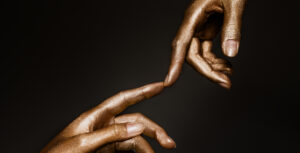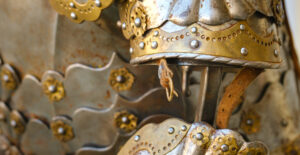
There’s a kind of gold in South Africa that doesn’t glitter. You can’t melt it down, pawn it, or wear it around your neck. But it opens doors, buys silence, pulls rank. It’s the kind of gold that walks into a room before you do. People call it respect. On the street, they call it “weight.” In the corridors of hustle, influence, and everyday survival, it’s reputation, and in today’s economy, it might be the only currency that still counts.
In some neighbourhoods, you’ll find men who haven’t had formal jobs in years but never pay for their own drinks. Women who never speak above a whisper, yet everyone leans in when they do. That’s reputation. It’s earned through years of presence, through knowing when to speak and when to stay silent, through the way your name lands when it’s mentioned in a room of strangers. A man can wear a R20,000 chain and still get ignored at the shebeen. Another might wear scuffed takkies and an old leather cap but carry himself with a weight that turns heads. He might not own gold, but he is gold, rare, valuable, untouchable in ways money can’t buy.
You see it in taxis. The front seat rider who never argues with the driver but is greeted with a respectful nod every morning. You see it at street corner barbershops, where one chair stays empty until a specific man arrives, no matter how many are waiting. You see it in how people speak about someone when they’re not around, if they speak at all. In this world, your name is your vault.
Reputation isn’t just about status. It’s about history. It’s what people remember you for when your number’s not saved on their phone anymore. It’s built quietly, sometimes over decades, and lost loudly in a single moment. One betrayal, one loud lie, one wrong turn, and your entire portfolio crashes.
In townships and small towns, the old economy of status used to revolve around visible wealth. You had to flash it. Gold teeth. A new car. Air Max sneakers that looked like you never walked. But somewhere between the crack of stolen electricity and the climb of unemployment rates, people started watching character more than chains. In the age of digital hustle, it’s not even about who you are, it’s about what people believe about you. The gold you wear can be fake. The gold you are can’t. And in a country where trust is often the first thing stolen, being believed in has become priceless.
A woman running a tuck shop in Limpopo becomes a local lender, not because she’s rich, but because she always pays on time. A security guard becomes the man everyone asks for help with ID documents, not because he has connections, but because he never mocks anyone’s struggle. A pastor becomes the unofficial mediator in street conflicts, not because of the pulpit, but because he once stopped a man from being stabbed outside a tavern, years ago, and everyone remembers.
This kind of reputation doesn’t show up on Instagram. You won’t see it in reels or retweets. But it moves things. It’s the whisper that gets you out of trouble. The story someone tells a stranger on your behalf when you’re not even there to defend yourself. The unspoken knowledge that if you say something, it carries weight, not because you’re loud, but because you’re known.
It exists in the informal economy as much as the formal one. In kasi kitchens and behind closed doors. In voice notes passed between cousins. In how you behave when the lights go out and no one’s watching. It’s not perfection, it’s consistency. You don’t need to be flawless to have it. You just need to be reliable. Present. Real. And sometimes, it’s the only thing protecting you. Because in a world where everything is up for sale, opinions, friendships, dignity, reputation is one of the few things that doesn’t come with a price tag, only a cost.
But here’s the twist, reputation can’t be self-declared. You can’t claim it. You can only reflect it. You can’t buy it. You can only earn it. And you can’t rush it. It ages like wine or wood smoke. Slowly, deeply, memorably.
That’s why those who have it speak carefully. They know the weight of words. They know that one careless laugh at the wrong joke, one step out of rhythm, and everything they’ve built can be undone. That’s why they’re always watching, always listening, always calculating the true cost of being seen.
 It’s also why they’re trusted. In a country riddled with scams, ghost jobs, and fake prophets, reputation has become the last real resource. Not gold, not Bitcoin, not brand collabs. Just that quiet thing people say about you when your name comes up. “He’s solid.” “She’s never failed me.” “If they said it, then it’s true.”
It’s also why they’re trusted. In a country riddled with scams, ghost jobs, and fake prophets, reputation has become the last real resource. Not gold, not Bitcoin, not brand collabs. Just that quiet thing people say about you when your name comes up. “He’s solid.” “She’s never failed me.” “If they said it, then it’s true.”
And when times get tough, and they always do, this is the currency that holds. When banks won’t lend, when jobs don’t call back, when the grant money is late, your reputation might be the thing that keeps you fed. Someone offers you work. Someone refers you to a cousin. Someone gives you their last R50 because they know you’ll bring it back. That’s the gold you can’t wear.
In South Africa, reputation outlives riches. Flash can die in a gunshot or get stripped in a bad month. But your name? That lives on. It travels across provinces, sits in WhatsApp groups, gets carried by aunties on buses, whispered at church meetings, passed down like recipes.
It’s not perfect. Reputation can also be a prison. One mistake and you wear it forever. One lie told about you, especially if you’re poor, female, or young, and it can become a wall you’ll spend years trying to climb. That’s the dark side of it. But even then, the only way back is the same way in, action, time, presence.
The people who truly hold power in our communities don’t always wear gold. Sometimes, they wear dusty jackets, cracked cellphones, or mismatched shoes. But they walk into rooms like they belong. Because they do. Their currency isn’t minted. It’s remembered. So next time you see someone being greeted with respect before they even speak, take note. They’ve been investing longer than you think.
And maybe, just maybe, it’s time to start your own account. Quietly. Consistently. In the way you show up. In the things you don’t say. In how you treat the people who can do nothing for you.
Because in this country, the gold you can’t wear? That’s the only gold worth chasing.



